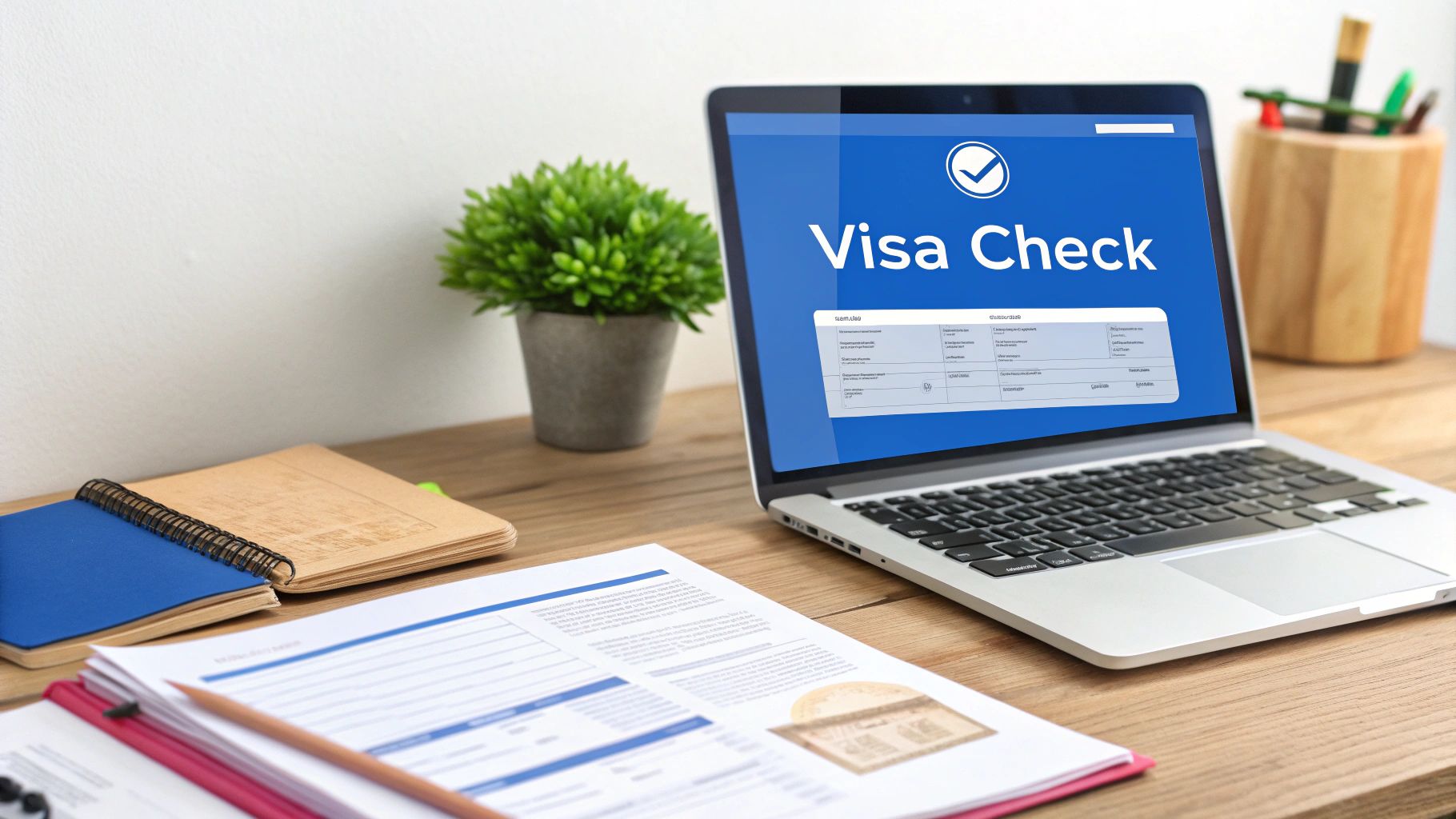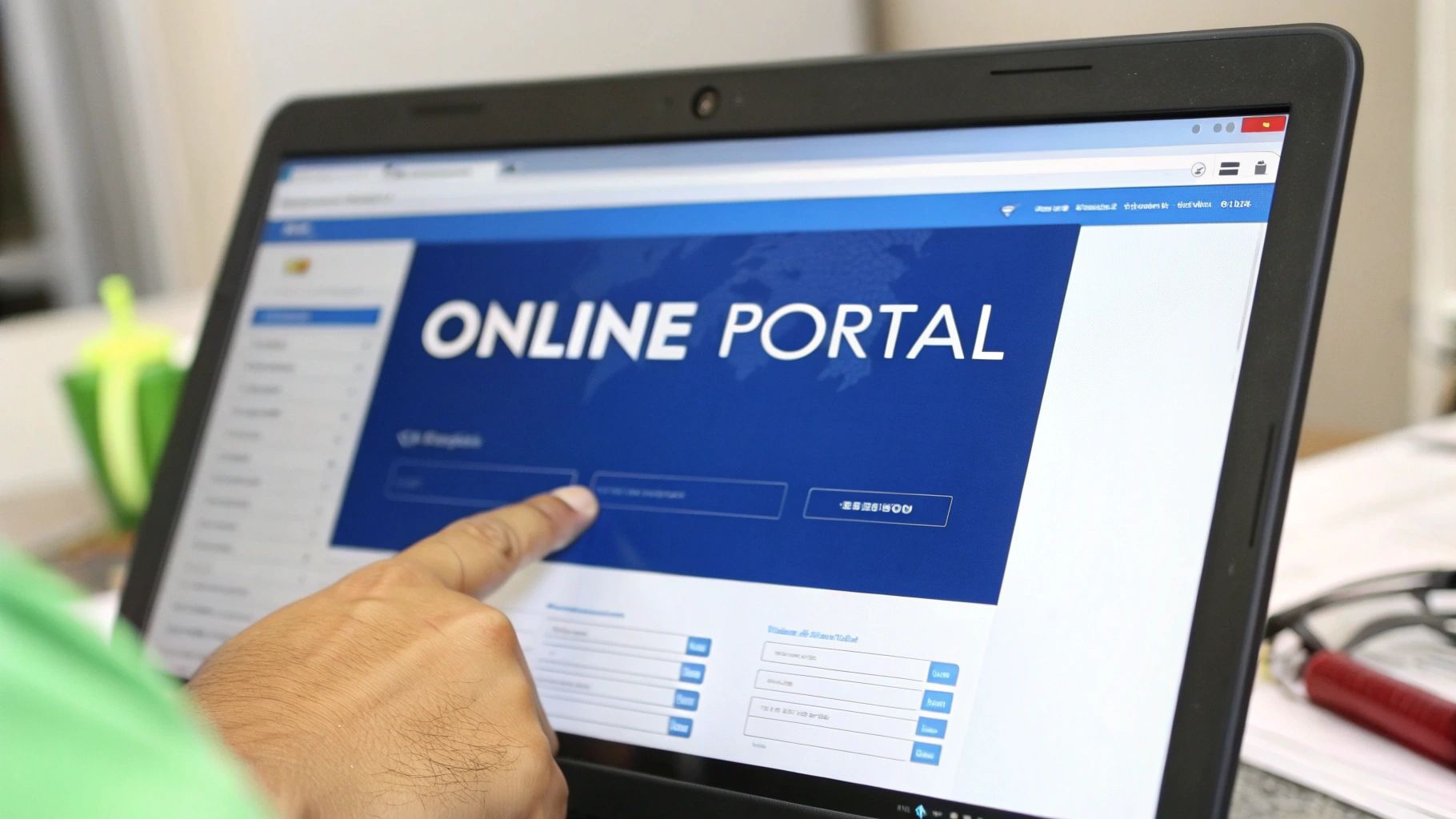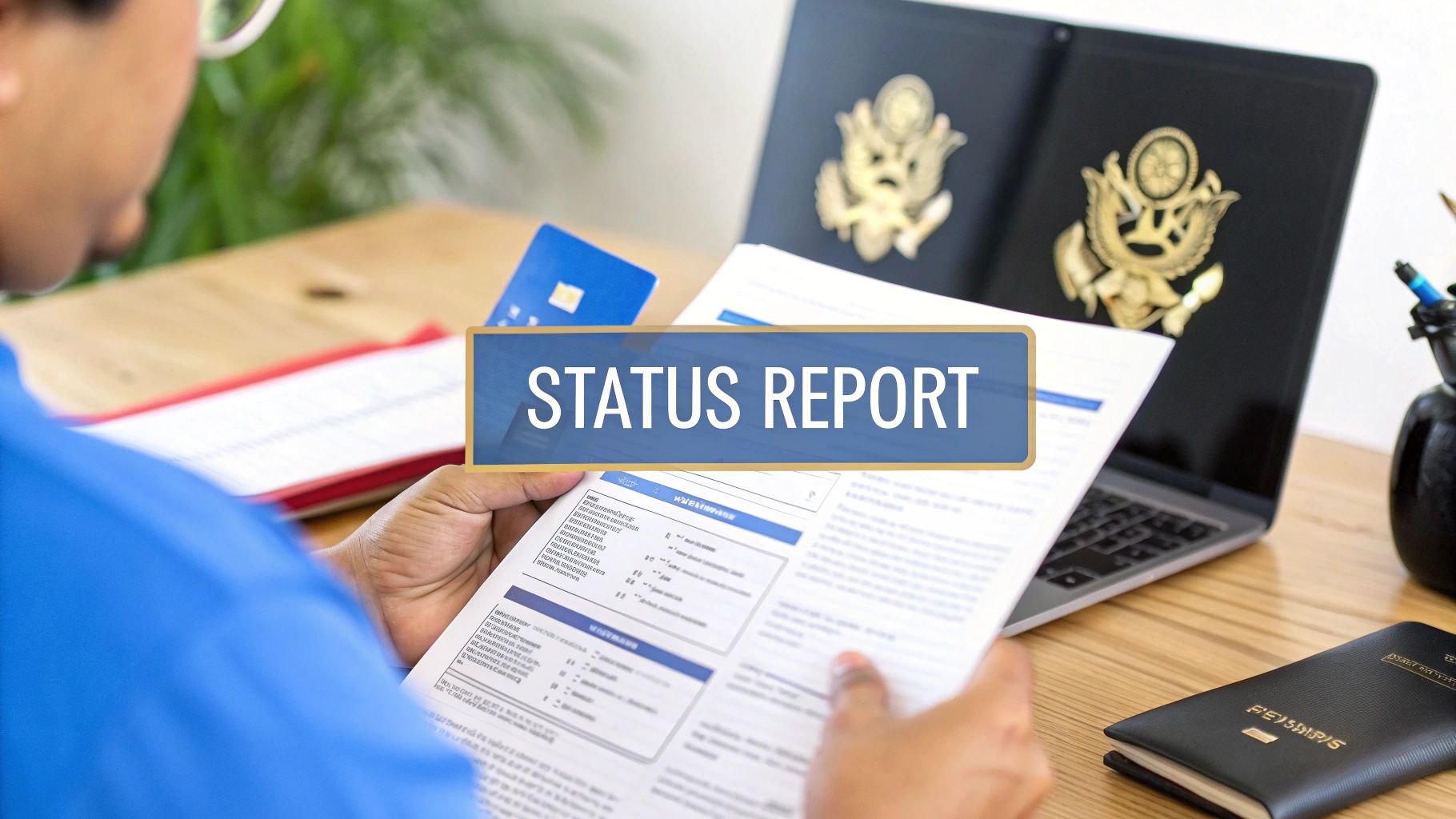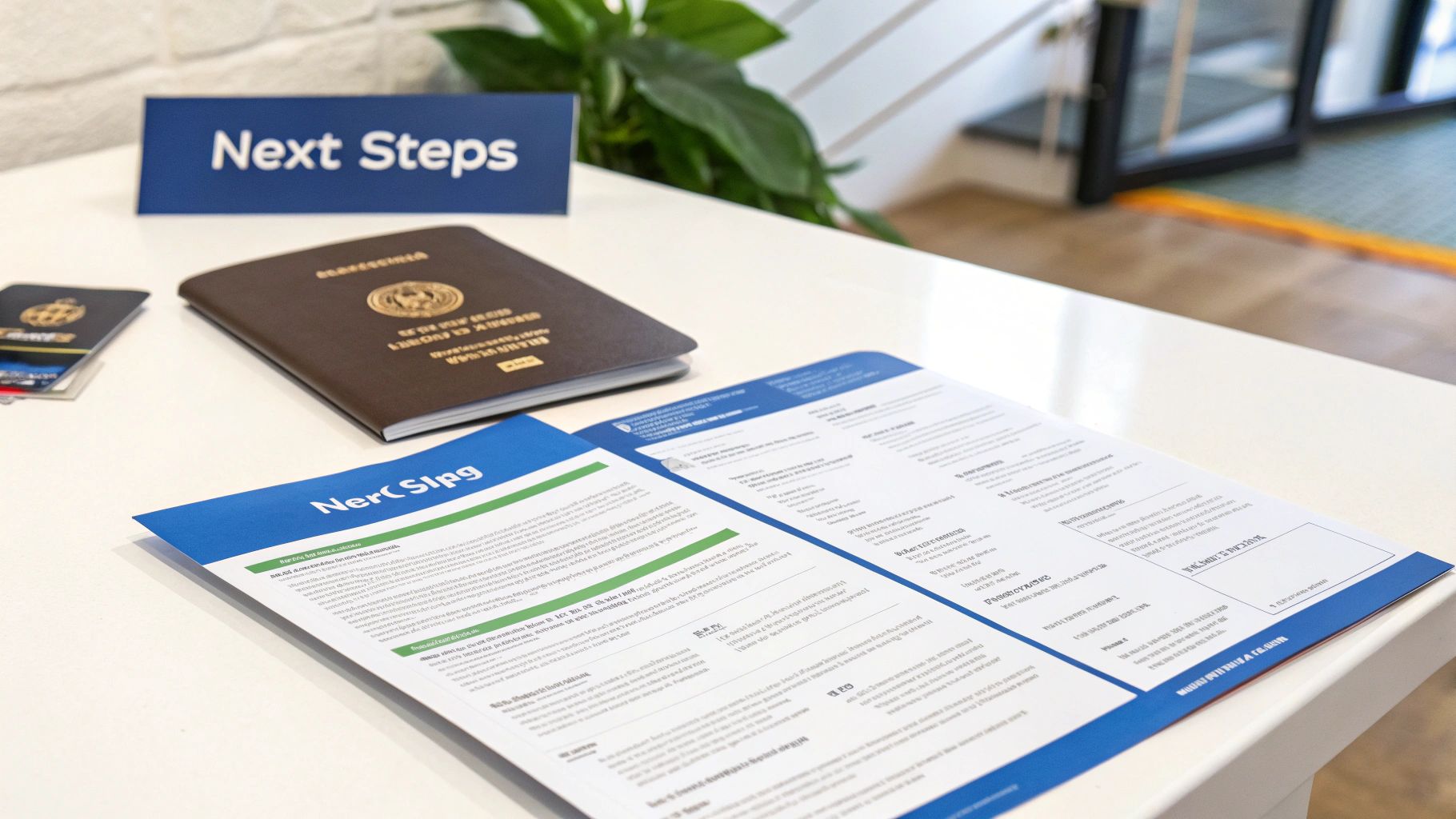How can i check my visa status? Get Answers Now

Demystifying Your Visa Application Journey

Applying for a visa can often seem like a daunting task. Deciphering the complexities of your visa status can add to this feeling. This section clarifies the application process from submission to decision. Understanding this journey can help you manage expectations and reduce any application anxieties.
Understanding Visa Status Terminology
Before exploring the application journey, it’s important to understand the terminology. Visa status refers to the current stage of your application within the immigration system. This status can range from Submitted to Approved, with various stages in between. Each status update offers insight into your application’s progress. For instance, an In Process status signifies your application is being reviewed by immigration officials.
The Typical Visa Application Journey
Your visa application journey starts with submitting your application and supporting documents. Upon receipt, your application receives a unique identification number. This number is vital for tracking your visa status online. The application then enters a preliminary screening to ensure completeness and basic eligibility.
Following this, your application moves to the in-depth review phase. Immigration officers carefully examine your application, verifying the information and assessing your eligibility against specific visa criteria. Depending on the visa type and individual circumstances, this can include background checks, security screenings, and interviews. You might find this resource helpful: How to master the US Visa application process.
Processing Timelines and Influencing Factors
Published average processing times provide a general estimate. However, several factors can affect the actual processing duration for your application. The application volume received by the embassy or consulate can influence processing times. Additionally, unexpected events like global occurrences or immigration policy changes can cause delays.
While this information doesn’t offer Nigeria-specific data, immigration authorities worldwide process millions of visa applications each year. In the US, the Visa Office reports handling over 10 million nonimmigrant visas annually, with Nigeria consistently among the top African applicants. While precise Nigerian figures aren’t readily available, the CEAC Status Check processes thousands of Nigerian applications daily, reflecting Nigeria’s consistent ranking among the top 5 African countries for US visa demand. Applicants can check their status at https://ceac.state.gov/ceacstattracker/ using their unique DS-160 ID. More detailed statistics can be found here: https://travel.state.gov/content/travel/en/legal/visa-law0/visa-statistics.html Understanding these factors helps set realistic expectations and prepares you for effectively monitoring your application’s progress.
Digital Tracking Tools That Actually Work
Checking your visa application status no longer requires endless phone calls and embassy visits. Digital tracking systems now offer a significantly more efficient method. This section explores the most reliable online platforms, providing you with the tools to easily monitor your application’s progress.
Online Platforms: Features and Accessibility
Various online platforms provide visa status checks, each with its own strengths and weaknesses regarding features, accuracy, and user-friendliness. Some offer comprehensive updates, while others provide more general information. To maintain secure access to your visa documents and application details, implementing solid document management best practices is crucial.
Before accessing any platform, ensure you have the necessary information, including your application number and passport details. Since each system has a distinct interface, familiarize yourself with the specific requirements of your chosen platform. For those applying for UK visas, this resource may be helpful: How to master UK visa requirements for Nigerian citizens.
Troubleshooting and Security
Technical issues can occasionally occur when using online tracking tools. Understanding common problems and their solutions can help avoid delays and frustration. For example, double-check that you’re using the correct website and entering your details accurately.
Most platforms employ strong security measures, such as encryption and secure login protocols, to protect your sensitive data and maintain confidentiality. Also, keep in mind that update frequencies vary. Some platforms provide daily updates, while others update less often.
Electronic Case Tracking and Its Impact
Electronic case tracking has greatly improved visa application processes. Systems like USCIS Case Status Online have demonstrably reduced manual inquiries by 30-50% in developed countries. Although specific data for Nigeria isn’t readily available, the global shift towards digitalization suggests similar improvements are occurring. This move toward electronic tracking aligns with post-9/11 security measures and GDPR data privacy regulations. Learn more about electronic case tracking here.
To assist you in choosing the right platform, we’ve compiled a comparison of some popular options for Nigerian travelers.
Understanding the capabilities and limitations of each platform is essential for maximizing the effectiveness of these digital tools.
Popular Online Visa Status Checking Platforms for Nigerian Travelers
This table compares different online platforms where Nigerians can check their visa application status, highlighting key features and requirements of each system.
| Platform Name | Issuing Country/Region | Required Information | Update Frequency | Additional Features |
|---|---|---|---|---|
| USCIS Case Status Online | USA | Receipt Number | Varies, typically within a few days of processing | Case history, upcoming appointments |
| UK Visas and Immigration | UK | GWF reference number, Passport number, Date of birth | Depends on application type, typically updated regularly | Email/SMS updates |
| VFS Global | Varies (multiple countries) | Application reference number, Passport Number, Date of birth | Depends on embassy/consulate processing times | Track application progress, SMS/email alerts, courier services |
| respective Embassy/Consulate websites | specific to the country | application-specific information | dependent on the consulate | depends on the consulate website |
This table highlights the different requirements and features of various visa tracking platforms. Choosing the right one depends on the specific country you’re applying to.
Utilizing Online Tracking Tools Effectively
To maximize the benefits of digital tracking tools, understand their capabilities and limitations. Some platforms offer detailed information about each processing stage, while others provide only basic status updates.
Knowing what to expect from each platform helps accurately interpret the information and manage expectations. By effectively using these digital resources, you can stay informed about your visa application status, anticipate potential delays, and ultimately streamline your application process.
When to Call or Email: Human Contact That Gets Results

While online tools offer convenience, direct contact with embassy or consulate officials can sometimes be necessary for clarity on your visa application status. This personal touch can make all the difference. This section offers guidance on making these crucial interactions productive.
Preparing For Contact: Essential Information
Before contacting anyone, gather all the necessary information pertaining to your application. This includes your application number, passport details, and the specific visa category. Having this information on hand will streamline the conversation and avoid unnecessary delays.
Also, prepare a concise list of specific questions. This helps you stay focused and ensures you get the answers you need.
Optimizing Your Communication Strategy
Timing is everything. Research the embassy or consulate’s operating hours and try to call during off-peak times to minimize wait times. When sending email inquiries, write a clear and professional message. State your purpose upfront and provide all relevant details. Keep it concise. Lengthy emails are more likely to be overlooked.
Country-Specific Contact Details and Response Times
Navigating communication channels can be challenging. To simplify this process, we are working on compiling country-specific contact details for major embassies serving Nigerian applicants. This resource will include phone numbers, email addresses, and website links.
We will also provide information on typical response times so you can manage your expectations.
Overcoming Common Challenges
Applicants often face hurdles like language barriers, conflicting information, and unresponsive officials. This section offers practical solutions. If you encounter a language barrier, consider using a translation app or asking a bilingual friend or family member for help.
If you receive conflicting information, politely explain the discrepancy and ask for clarification. If officials are unresponsive, respectfully follow up. If necessary, consider escalating your inquiry through the proper channels.
By understanding how and when to use phone and email effectively, you can supplement online tracking with personalized assistance, increasing your chances of successfully checking your visa status. For more information on potential roadblocks and solutions, see our guide on common visa rejection reasons. Staying informed and proactive is crucial throughout the visa application journey.
In-Person Status Checks: When to Visit and What to Expect
While online tracking is often the quickest way to check your visa status, sometimes a personal touch is needed. In-person visits to application centers or embassy facilities remain a viable option, particularly for complex cases or when digital methods fail to provide sufficient information. This section explores the benefits and process of in-person inquiries.
Why Choose an In-Person Visit?
In-person visits offer a valuable opportunity to directly address your concerns with an immigration official. This can be especially helpful if your online status is unclear or you have specific questions requiring personalized answers. For instance, you might need to clarify documentation requirements or address a discrepancy in your application.
In addition, an in-person visit can demonstrate your commitment to the application process. However, it’s important to approach these visits strategically. Careful planning is crucial for a successful outcome.
Preparing for Your Visit: Appointments and Documentation
Most embassies and application centers require appointments for in-person inquiries. Scheduling an appointment in advance avoids long waits and ensures you’ll meet with an official. When scheduling, be sure to confirm the required documents. Typically, this includes your passport, application confirmation, and any supporting evidence relevant to your case.
Careful preparation can significantly influence the outcome of your visit. Plan your trip to the embassy or application center, considering potential traffic delays, particularly in major cities like Lagos or Abuja.
Navigating Security and Embassy Protocols
Embassies and application centers maintain strict security protocols. Be prepared to undergo security checks, including metal detectors and bag inspections. Dress professionally and respectfully, as this demonstrates respect for the process and the officials.

Reciprocity reports show how visa issuance fees and validity periods vary depending on your nationality. For US visa applicants from Nigeria, validity typically ranges from 1-5 years for frequent travelers, based on historical data. However, over 60% of visa status systems worldwide now utilize web portals. Nigeria follows this trend with US/Nigerian partner portals, making online checks more common. Find more detailed statistics here: Visa Reciprocity and Civil Documents by Country.
Making the Most of Your Visit: Effective Communication
During your visit, maintain a polite and respectful demeanor when interacting with officials. Clearly state your purpose and ask specific questions. Be prepared to answer additional questions about your application and have copies of supporting documents readily available.
Being proactive and well-prepared can turn potential challenges into opportunities for advancement. Understanding the specific cultural context of the embassy you’re visiting can also be beneficial. Different embassies may have varying communication styles and expectations.
After Your Visit: Follow-Up and Next Steps
After your visit, summarize the key points discussed and any necessary next steps. If the official provided specific instructions, follow them diligently. If you were asked to submit additional documents, do so promptly.
If you haven’t received an update within the given timeframe, follow up politely via email or phone. An in-person visit, though sometimes demanding more effort, can be extremely valuable in clarifying your visa status and furthering your application.
Decoding Status Messages: What They Actually Mean
Understanding your visa status updates is key to a smooth immigration process. These messages, often shrouded in official language, can be confusing. This section clarifies common visa status notifications and what they mean for Nigerian applicants. Knowing how to interpret these updates empowers you to take the right steps and manage your application effectively.
Common Visa Status Notifications and Their Meanings
Several standard status updates appear during the visa application process. Let’s break down some of the most frequent ones:
“Submitted”: This confirms the embassy or consulate has received your application. It’s the first step in the process.
“Under Review” or “In Process”: Your application is being reviewed by immigration officials. This stage involves a thorough examination of your application and supporting documents. The length of this phase varies based on factors like application volume and your case’s complexity.
“Administrative Processing”: This status often worries applicants. However, it doesn’t necessarily signal a problem. It usually means additional checks are needed, such as security screenings or further information verification.
“Ready for Interview” or “Interview Scheduled”: If your visa requires an interview, you’ll get this notification confirming the date and time. Prepare thoroughly, bringing all required documents.
“Approved”: Your visa has been approved! You can now finalize your travel plans.
“Refused” or “Denied”: If your application is refused, you’ll receive a notification explaining why. Carefully review the reason as you might be able to reapply or appeal.
Interpreting Statuses Based on Visa Type and Nationality
The meaning of a status update can differ depending on the visa type and your nationality. For instance, “Administrative Processing” might be longer for certain nationalities or visa categories due to stricter security checks. Understanding these nuances helps set realistic expectations.
Realistic Timeframes and Follow-Up Actions
Knowing typical processing times for your visa category helps gauge if your application is on track. While official websites offer estimated processing times, actual durations can change. The following table provides a general overview of common visa status notifications, their meaning, average duration, recommended action, and the level of concern they might warrant.
To help you better understand the visa application process, we’ve compiled a table outlining common status updates and their implications.
Decoding Visa Status Notifications
| Status Notification | Meaning | Average Duration | Recommended Action | Need for Concern |
|---|---|---|---|---|
| Submitted | Application received | 1-3 business days | None | Low |
| Under Review/In Process | Application being assessed | Varies greatly depending on visa type and country | Check online portal regularly | Moderate, especially if exceeding typical processing times |
| Administrative Processing | Additional checks required | Weeks to months | Wait patiently, contact the embassy/consulate if processing time is excessive | Moderate to High depending on duration |
| Ready for Interview | Interview scheduled | N/A | Prepare for the interview, gather all necessary documents | Low |
| Approved | Visa granted | N/A | Make travel arrangements | None |
| Refused/Denied | Visa application rejected | N/A | Review reason for refusal, consider reapplying or appealing | High |
This table provides a general overview. Always check the official embassy or consulate website for the most current processing times for your visa category. If your application seems unusually delayed, contact the embassy or consulate for an update. Proactive communication is important when tracking your visa status. Be patient and respectful when communicating with officials. For further advice on navigating visa application challenges, check out our blog post on troubleshooting visa issues. Understanding these nuances helps you navigate the visa application process more confidently.
Troubleshooting Like a Pro: Solutions for Common Roadblocks

Even with the most careful planning, Nigerian visa applicants can sometimes encounter unexpected issues. This section offers practical solutions to common problems, ranging from a misplaced application number to more complicated situations like conflicting information. We’ll provide the tools and insights you need to overcome these obstacles effectively.
Missing Application Number or Incorrect Details
One of the most frequent problems is a missing application number. This crucial piece of information is necessary for tracking your application’s progress online. If you can’t locate it, carefully retrace your steps. Review email confirmations, application receipts, and any physical documents you’ve received.
Also, ensure all the details you enter, such as your name and passport number, are absolutely accurate and match your application precisely. Even small inconsistencies can prevent you from accessing your records.
System Errors and Website Issues
From time to time, official websites experience technical difficulties. This can be especially frustrating when you need to check your status urgently. If you encounter a system error, try again after some time. Websites often undergo scheduled maintenance, which might cause temporary interruptions.
If the issue persists, clear your browser’s cache and cookies. You could also try using a different browser entirely.
Conflicting Information From Different Sources
Information obtained from different sources, such as online portals and email updates, can sometimes appear to conflict. Try not to worry. One source might simply be more current than another. However, if the discrepancies are significant, contact the relevant embassy or consulate directly to get clarification.
Escalation Pathways for Stalled Applications
If your application seems to be stuck, there are ways to escalate your inquiry without causing any harm to your case. Start by politely following up with the embassy or consulate via email or phone. Clearly state your application number and explain your situation calmly.
If this doesn’t lead to a satisfactory resolution, consider contacting your local representative or seeking guidance from an immigration lawyer. You may also find this helpful: How to master troubleshooting visa issues.
Real-World Examples and Region-Specific Insights
Many Nigerian travelers face specific administrative challenges. For instance, delays related to document verification are common. Knowing this, ensure all your documents are complete, accurate, and readily available.
Another common issue is potential name discrepancies due to variations in spelling or formatting between Nigerian and international systems. Carefully double-check for consistency in your application materials. These practical tips, based on the experiences of other successful applicants, offer valuable region-specific guidance. By addressing these common obstacles directly, you can navigate the visa application process more smoothly and turn potential setbacks into progress towards your travel goals.
Ready to take control of your relocation journey? JapaChat, Nigeria’s leading AI immigration expert, offers personalized guidance and support at every stage. From visa requirements to travel logistics, we provide the information and resources you need to relocate with confidence. Sign up for free today and discover the power of informed planning with JapaChat!

Leave a Reply